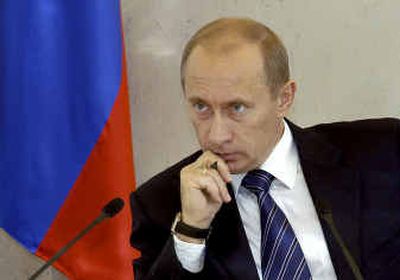Russia closer to signing Kyoto treaty

MOSCOW – The Russian Cabinet gave its approval to the Kyoto Protocol on Thursday in the strongest sign yet that the treaty to fight global warming would win enough worldwide support to come into force.
The Duma, or the lower house of parliament, must give its backing and President Vladimir Putin his signature before Russia ratifies the treaty, but those actions are expected.
It is now “99 percent certain” that the Kyoto Protocol will come into effect, said Alexei Kokorin, coordinator of the World Wildlife Fund’s climate change program in Russia. “Global society at last made a practical step to mitigate global warming,” he said.
The treaty was designed to slow global warming by reducing air pollution, particularly the release of carbon dioxide, which many scientists believe creates a greenhouse effect. Nations that sign on are required to reduce their emissions of six key gases to 5.2 percent below 1990 levels by 2012.
The fate of the 1997 accord hangs on Moscow’s final decision. While more than 120 countries have ratified the pact, Russia’s support is needed to reach a key standard for it to take effect: approval by countries that accounted for at least 55 percent of global emissions in 1990.
The pact’s requirements would not apply to the United States. The Bush administration pulled out of the agreement in 2001, citing potential harm to the American economy if companies were compelled to cut such emissions. However, it could increase pressure on the United States to do more to control emissions.
In Washington, State Department spokesman Richard Boucher said Thursday that the administration has not changed its view on the treaty. But he noted that “it’s up to other nations to independently evaluate whether ratification is in their national interests.”
Boucher added that the United States is committed to taking action on climate change, through efforts aimed at reducing greenhouse gases by pursuing cleaner energy technologies and research on the problem.
Even supporters say the Kyoto Protocol is only a first step toward addressing the threat of global warming, with much greater efforts needed in future decades.
The United States was responsible for 36 percent of greenhouse gas emissions in 1990, meaning that ratification by nearly all other industrial countries is required to put the treaty into effect. Japan and members of the European Union have all given their backing. Russia’s share of 1990 global emissions was 17 percent.
One of the major attractions of the treaty for Russia is a provision under which countries that have lowered their greenhouse gas emissions more than required can sell pollution credits to other nations that produce gases over their treaty limit.
By some estimates, Russia – where emissions have fallen by one-third since 1990 as production by heavy industries has slipped – might gain over $1 billion a year in 2008-12 by selling credits.
Viktor Danilov-Danilyan, a former ecology minister now at the Russian Academy of Sciences, said his nation could benefit from pact in other ways: Russia has already used the treaty as a bargaining chip to win trade concessions from the European Union, and it could gain recognition for helping to slow global warming.
U.S. environmentalists praised Russia.
“Sadly, this leaves the U.S. isolated in its refusal to join the international effort to reduce greenhouse gas pollution,” said Fred Krupp, president of Environmental Defense.
While congressional advocates of action to address global warming have said it is unrealistic to expect U.S. approval of the Kyoto accord, two senators said Thursday that the United States must address its emission problems. Sens. John McCain, R-Ariz., and Joe Lieberman, D-Conn., propose a modified system of caps to enforce improved U.S. standards.